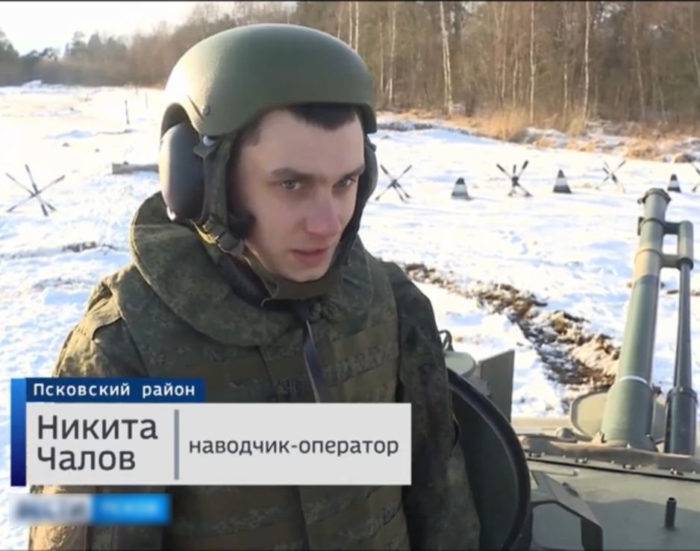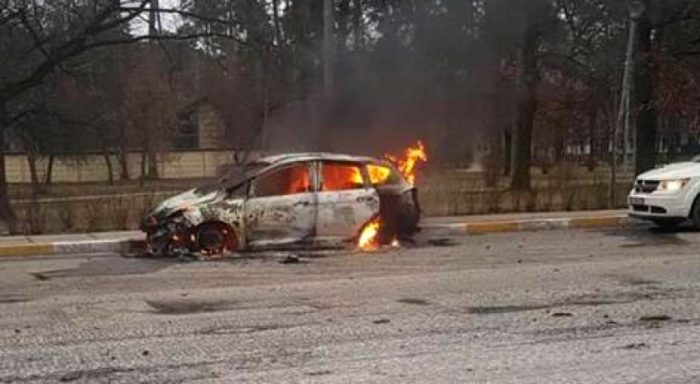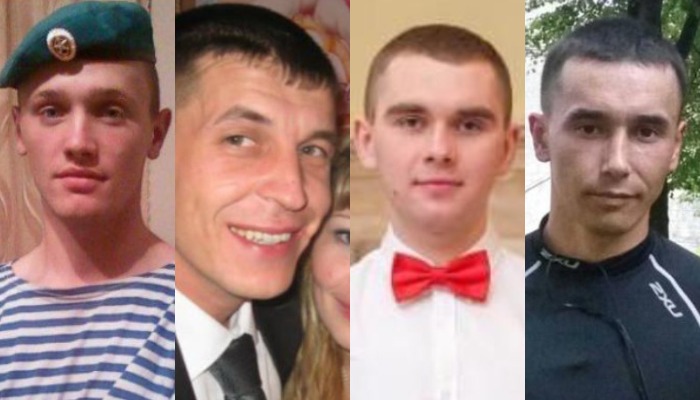The court has begun hearing the case of Russian paratrooper Nikita Chalov, who is accused of murdering civilians in Bucha.
The Irpin City Court has begun substantive hearings in the case of Russian paratrooper Nikita Chalov, who is suspected of shooting civilians during the occupation of Bucha. Among the victims were two children from a displaced family that moved from Donetsk back in 2014.
This was reported by the MIPCH publication.
 A screenshot from a Russian video report featuring the suspect, Chalov
A screenshot from a Russian video report featuring the suspect, Chalov Present at the hearing were the victims Alexander Chikmarev, Galina Tovkach, their relative Tatyana, their lawyer Alexey Yasyunetsky, the accused's defense attorney Andrey Dyachenko, and representatives from the prosecution.
The session began with a motion from the prosecution, which requested to conduct a special judicial proceeding in absentia, as the suspect did not appear in court. A summons in his name was published in the “Uryadovyi Kuryer,” and the SBU even established the suspect's phone number, so a corresponding message was sent to him.
Presiding Judge Yana Shestopalova noted that the provided copies of the attachments from the “Uryadovyi Kuryer” were unreadable, and thus asked the accused's lawyer whether he had received the indictment in Russian. He replied that he had not received such a document. Addressing the prosecutor, Shestopalova pointed out that the court lacked the necessary documents to identify the suspect.
The prosecutor promised to provide all required documents and requested to postpone the hearing until January 29, 2025.
Additionally, the victims' lawyer approached the court to file a civil lawsuit. This can be done through the court's registry.
“Russia has committed evil throughout its history, but there has never been a legal assessment of these crimes. The actions of the aggressor state are primary because, if it weren't for Russia, neither Chalov nor other Russian soldiers would be here, and no crimes would have been committed,” Yasyunetsky added during the session.
According to the lawyer, the detention during the court session is a technicality and quite typical for the Ukrainian judicial system. However, for the victims, each such hearing is a heavy ordeal, as it forces them to revisit the memories of that tragic day.
 One of the vehicles shot at by the suspect, a Russian soldier, in Bucha. Photo: National Police
One of the vehicles shot at by the suspect, a Russian soldier, in Bucha. Photo: National Police Investigators charged the Russian Chalov back in May 2023. As a result of his actions, part of the Chikmarev family was killed in one vehicle, having moved from Donetsk in 2014: the mother and two boys aged four and nine. A man sustained serious injuries and underwent an amputation.
In the second vehicle was the Tovkach family. As a result of the shooting, the husband was killed, while the wife and another woman were injured. The victims were neighbors, their cars had no tinting, and when they saw the Russian soldiers, they stopped. Before deciding to flee Bucha, the families had spent several days in a basement.
Four other Russian soldiers may also be involved in the shooting of the Chikmarev and Tovkach families. Their names were identified by journalists from “Suspilne,” who conducted their own investigation into the tragedy. They are:
- crew commander Senior Sergeant Aleksey Churin;
- shooter-operator Alfred Yakubov;
- driver-mechanic Sergey Demidov;
- Junior Sergeant Vladimir Kravets.
 Sergey Demidov, Aleksey Churin, Vladimir Kravets, and Alfred Yakubov
Sergey Demidov, Aleksey Churin, Vladimir Kravets, and Alfred Yakubov It is worth noting that UN experts discovered a pattern of attacks by Russian soldiers on civilians in the Kyiv, Kharkiv, and Sumy regions.
What connects all these attacks is that the victims were on the road to meet basic needs, such as food, were in civilian clothing, were unarmed, and some vehicles had “Children” written on the windows.